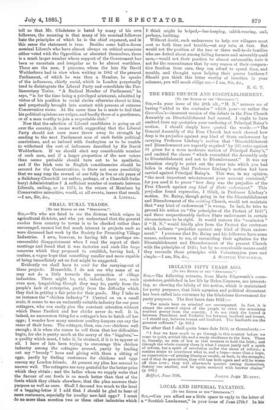THE FREE CHURCH AND DISESTABLISHMENT.
[TO THE EDITOR OF THE "SPFCTATOR.")
SIR,—In your issue of the 20th ult., "M. N." accuses me of having "added to the confusion " which your—or rather the Guardian's—incorrect version of the debate in the Free Church Assembly on Disestablishment had caused. I ought to have omitted from my quotation your rendering of Principal Rainy's motion. I should simply have quoted the words : —" The General Assembly of the Free Church last week showed how deep is its prejudice against any kind of State endowment by carrying Professor Lindsay's motion that Disestablishment and Disendowment are urgently required' by 365 votes against 91 given for a more moderate motion of Principal Rainy's," and omitted the clause " which committed the Assembly only to Disestablishment and not to Disendowmeut:" It was my intention simply to point out the error into which you had fallen in stating that Professor Lindsay's motion had been carried against Principal Rainy's. This was, in my opinion, "the most important misstatement your account contained," for you used it to prove " how deep was the prejudice of the Free Church against any kind of State endowment." This prejudice found expression, I think, in Professor Lindsay's motion. Dr. Rainy, though going in for the Disestablishment and Disendowment of the existing Church, would not maintain that " any kind of endowment " is wrong. In fact, he tries to ground his action on "the principles of the Protest of 1843"; and these unquestionably declare State endowment in certain circumstances to be right. It would remove the " confusion " if "M. N." would kindly give from the Protest the sentences which indicate "prejudice against any kind of State endow- ment." I presume that Dr. Rainy and his followers have some means, unknown to me, of reconciling their agitation for the Disestablishment and Disendowment of the present Church with the principles of 1843 ; but by no conceivable means could they reconcile those principles with Voluntaryism pure and


































 Previous page
Previous page